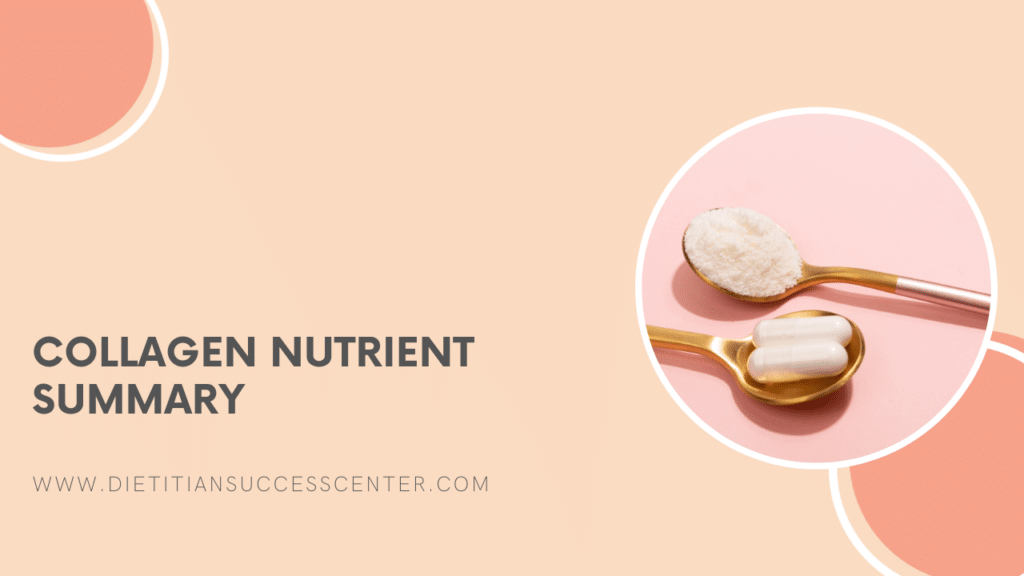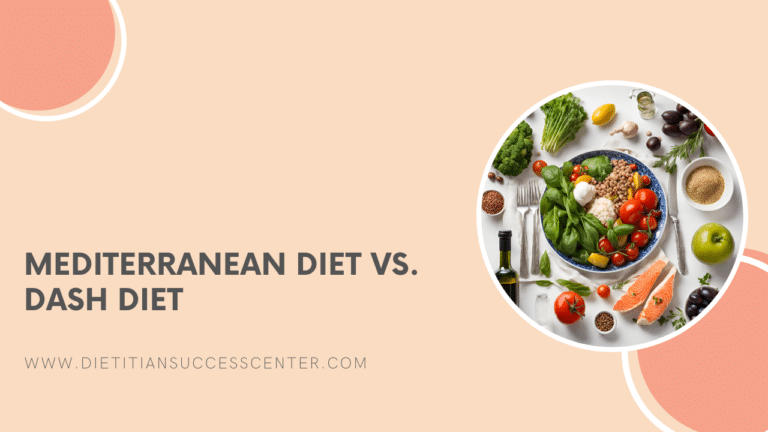
Written by Olivia Farrow, RD, MHSc
Reviewed by Krista Kolodziejzyk, RD, MPH, MBA
Collagen
This article will provide an overview of collagen, an increasingly popular supplement, its role in the body, potential benefits, and supplement recommendations.
Collagen, the predominant structural protein in the body, plays a role in maintaining connective tissue and skin integrity (1). The aging process naturally leads to a decline in collagen levels, causing a gradual deterioration of connective tissues (2). Consequently, dietary and supplemental collagen intake has been suggested to support the upkeep of connective tissues (2).
For a full collagen evidence summary, join Dietitian Success Center’s membership. The membership includes access to comprehensive yet simplified reference guides for supplements, food sources lists, and client-facing handouts for many nutrients, including collagen.
Food Sources
Dietary collagen is found in the connective tissues of animal foods, including tough cuts of meats, gelatin, fish bones, and skin (2). Protein-rich foods from animal sources and legumes contain amino acids that support collagen production in the body (2). Vitamin C and Zinc also play a role in collagen production (2).
Collagen Supplements
Collagen supplements are typically made from either animal or fish skin and bone (3). Supplemental collagen is generally found in the form of peptides, also called hydrolyzed collagen, a broken-down form that the body can absorb more easily (3,4). Collagen research is fairly new; optimal dosages or safety measures have not yet been identified.
Collagen supplements have been theorized to have potential benefits for many connective tissue-related purposes, including
- Skin aging: Overall, there is still a lack of quality research available on the efficacy of collagen supplements and skin aging (5).
- Joint health: Several studies have shown the positive effects of collagen peptide supplementation in reducing joint pain, improving joint function, and increasing pain-free strenuous exertion (6). Further human studies are needed to better understand the mechanisms involved.
- Osteoarthritis: Some research has supported the use of collagen supplements for the improvement of osteoarthritis symptoms, though more high-quality evidence is needed to make definitive conclusions (7,8).
- Body composition: Collagen peptide supplementation, when combined with resistance training, has shown positive effects on body composition and muscle strength (9,10,11). Collagen peptide supplementation may also improve recovery from exercise, with reduced symptoms of delayed onset muscle soreness and lower plasma biomarkers for muscle damage and inflammation (9,10). Further research is needed to explore the optimal dosage, timing, and specific mechanisms of collagen supplementation for different populations and exercise modes (9,10,11).
Supplement Safety
Long-term collagen supplementation is considered to be safe with a low risk of side effects, even at high doses and in different forms (2,9).
References
1. Ricard-Blum, S. (2011). The Collagen Family. Cold Spring Harbor Perspectives in Biology, 3(1), a004978–a004978. 10.1101/cshperspect.a0049782. Harvard College. “The Nutrition Source: Collagen”. (2021). Available from https://www.hsph.harvard.edu/nutritionsource/collagen/
3. Alcock RD, Shaw GC, Burke LM. Bone Broth Unlikely to Provide Reliable Concentrations of Collagen Precursors Compared With Supplemental Sources of Collagen Used in Collagen Research. Int J Sport Nutr Exerc Metab. 2019 May 1;29(3):265-272. doi: 10.1123/ijsnem.2018-0139. Epub 2018 Sep 26. PMID: 29893587.
4. de Miranda RB, Weimer P, Rossi RC. Effects of hydrolyzed collagen supplementation on skin aging: a systematic review and meta-analysis. Int J Dermatol. 2021 Dec;60(12):1449-1461. doi: 10.1111/ijd.15518. Epub 2021 Mar 20. PMID: 33742704.
5. Khatri M, Naughton RJ, Clifford T, Harper LD, Corr L. The effects of collagen peptide supplementation on body composition, collagen synthesis, and recovery from joint injury and exercise: a systematic review. Amino Acids. 2021 Oct;53(10):1493-1506. doi: 10.1007/s00726-021-03072-x. Epub 2021 Sep 7.
6. Coppola D, Oliviero M, Vitale GA, Lauritano C, D’Ambra I, Iannace S, de Pascale D. Marine Collagen from Alternative and Sustainable Sources: Extraction, Processing and Applications. Mar Drugs. 2020 Apr 15;18(4):214. doi: 10.3390/md18040214. PMID: 32326635; PMCID: PMC7230273.
7. García-Coronado, et al. Effect of collagen supplementation on osteoarthritis symptoms: a meta-analysis of randomized placebo-controlled trials. Int Orthop. 2019 Mar;43(3):531-538. doi: 10.1007/s00264-018-4211-5. Epub 2018 Oct 27. PMID: 30368550.
8. Moskowitz RW. Role of collagen hydrolysate in bone and joint disease. Semin Arthritis Rheum. 2000 Oct;30(2):87-99. doi: 10.1053/sarh.2000.9622. PMID: 11071580
9. Khatri M, Naughton RJ, Clifford T, Harper LD, Corr L. The effects of collagen peptide supplementation on body composition, collagen synthesis, and recovery from joint injury and exercise: a systematic review. Amino Acids. 2021 Oct;53(10):1493-1506. doi: 10.1007/s00726-021-03072-x. Epub 2021 Sep 7.
10. Kirmse M, Oertzen-Hagemann V, de Marées M, Bloch W, Platen P. Prolonged Collagen Peptide Supplementation and Resistance Exercise Training Affects Body Composition in Recreationally Active Men. Nutrients. 2019 May 23;11(5):1154. doi: 10.3390/nu11051154. PMID: 31126103; PMCID: PMC6566878.
11. Zdzieblik D, Oesser S, Baumstark MW, Gollhofer A, König D. Collagen peptide supplementation in combination with resistance training improves body composition and increases muscle strength in elderly sarcopenic men: a randomised controlled trial. Br J Nutr. 2015 Oct 28;114(8):1237-45. doi: 10.1017/S0007114515002810. Epub 2015 Sep 10. PMID: 26353786; PMCID: PMC4594048.








